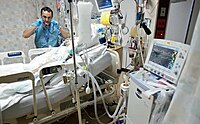
Photo from wikipedia
Background: Nursing accounts for 560 full time equivalents working in Acute Medical Units in Ireland. The National Acute Medicine Programme (NAMP), was launched in 2010. It is a multidisciplinary initiative… Click to show full abstract
Background: Nursing accounts for 560 full time equivalents working in Acute Medical Units in Ireland. The National Acute Medicine Programme (NAMP), was launched in 2010. It is a multidisciplinary initiative focusing on acute hospitals, providing leadership and direction for the development, reconfiguration and establishment of Acute Medicine in Ireland. Its aim is to optimise, standardise and improve management of acutely ill medical patients throughout the Irish Healthcare system, providing immediate and early specialist management of adult patients with a wide range of medical conditions who present to the hospital or from within the hospital, and who require urgent or emergency care and are discharged to an appropriate setting. Problem: Acute medicine nurses plays a central role in the immediate triage, assessment, planning, implementation and co-ordination of care across multiple settings from primary care, acute floor, diagnostics, in-patient settings and back into the community. Being a new speciality acute medicine nursing staff were drawn from a range of in-patient and specialist medical settings. There was a need to establish a structure at national level to harness and maximise the contribution of nurses to medical assessment and ambulatory medical care. Hilights: This contribution outlines the history of the development of acute medicine nursing over a six year period 2011-2017, hilighting key milestones in the contribution to interdisciplinary care, patient flow across the care continuum, unit management, and role definition. It also identifies national structures and processes implemented to support clinical skills and role development in acute medicine nurses at core, enhanced / specialist and advanced nurse practice levels. Transferability: The approach adopted has laid a foundation for sound needs based decision making informing education provision and development of advanced practice roles on a national basis. Conclusion: Establishing a structure to support nurses working within a national clinical care programme has facilitated consistency of approach aimed at promoting broad based scopes of practice promoting: enhanced access to services, hospital avoidance, reduced length of in-patient stay, clinical decision making and integrated care processes for acutely unwell medical patients. Skills and competencies developed through a national educational programme are transferable across all acute medical units. Interaction with third level education providers ensures consistency of approach to developing the role of acute medicine nurses. The structures have created career pathways not previously in place for nurses in the speciality of acute medicine.
Journal Title: International Journal of Integrated Care
Year Published: 2017
Link to full text (if available)
Share on Social Media: Sign Up to like & get
recommendations!